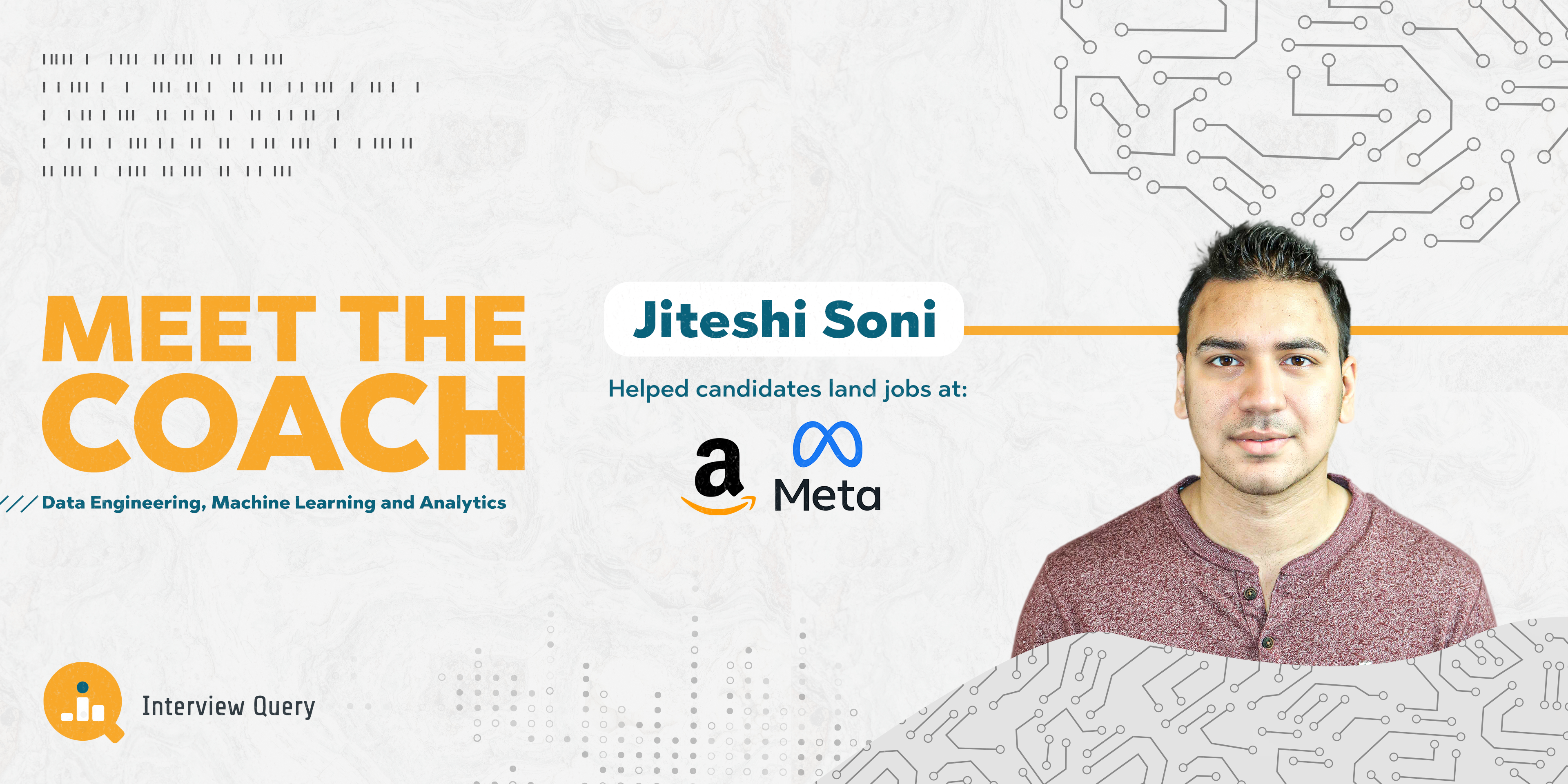Meet the Coach: Jitesh - Learn from the Experienced
Intro
Today we’re interviewing Jitesh Soni, one of our Interview Query coaches, who has a diverse background in data engineering, analytics, and machine learning across multiple companies.
Jitesh is passionate about sharing his knowledge and we are delighted to learn more from his industry insights and tips to help you land your next dream job at a top company.
Meet Jitesh
Jitesh has a wide range of experiences in data engineering, analytics, and AI spanning multiple countries, including the US, Canada, and India. He worked as a data engineer at Amazon and as a data architect at AWS, and currently works as a Specialist Solution Architect for Databricks.
Coaching approach: Jitesh tailors his coaching strategy by first building a framework to identify and track candidates’ baseline knowledge and abilities, and then working to provide resources to develop the additional skills required to crack their dream job.
Where his candidates work: He has helped candidates land dream jobs as data, research, and applied scientists at Amazon, Meta, and other top tech companies.
Q&A
What’s your background?
I have a decade of experience in Analytics and Machine Learning. I initially started as a Business Intelligence Engineer, then transitioned to Data Engineering, and most recently to Data Architecture. Furthermore, I have a Master’s in Big Data from Simon Fraser University.
On a day-to-day basis, I work with multiple startups and enterprises on projects related to streaming, real-time analytics, ETL, data architecture, etc.
How did you get into Data & Analytics?
I started my career in 2012 at TCS, where I started my first data warehousing and business intelligence project. My goal was to design the best and most performant ETL pipeline, and I started by conducting research on how to do so.
However, my initial searches did not result in nuanced answers so I switched over to reading over books and guides, as well as doing performance benchmarks with real data modeling. This curiosity significantly enhanced my knowledge to a point that, within two years, I landed a role as a Data Engineer at Amazon’s central Data Warehousing team in India.
After spending eight months at Amazon in India, I decided that I wanted to develop a more in-depth foundation within an academic setting, ultimately through pursuing a specialized Master’s in Big Data from Simon Fraser University. My internship landed me at Amazon in Seattle, where I continued my journey with Spark, Delta, Redshift, DynamoDB, Glue, etc.
Over the years, I have built data platforms using AWS and orchestrated data engineering and machine learning pipelines at a terabyte scale. Currently, I work with multiple organizations in solving real-life data challenges. Here’s some of my work in the public domain:
- How Audantic Uses Databricks Delta Live Tables to Increase Productivity for Real Estate Market Segments
- ARC Uses a Lakehouse Architecture for Real-time Data Insights That Optimize Drilling Performance and Lower Carbon Emissions
What advice do you have for people looking for data engineering and analytics jobs right now?
If you have a background in any kind of data processing or manipulation, you already have the core technical skill set needed to transition and excel in data and analytics. The next step is learning about how the tools/databases work and operate, which is information that is generally not very well documented. I recommend taking a two-step approach:
- First, work on developing your knowledge of data engineering concepts. I personally recommend this guide on data systems and applications.
- Thoroughly read product/database documentation and work on drawing parallels
I have coached several candidates from diverse backgrounds in transitioning to analytics and becoming successful practitioners and experts in the field. My general advice to candidates interested in data analytics is to not be intimidated by the transition – they might already have several skills needed to get into the field!
Generally, they may only need to work on increasing their understanding of the core concepts abstracted by the various tools in order to land jobs at top tech companies and startups successfully.
What specific actions can candidates take to land data engineering jobs?
1. Practice interviewing
As you start applying for jobs and come close to the on-site interviewing process, doing a few mock interviews with peers and experienced coaches who can give you personalized feedback to improve your interview performance will be highly beneficial.
Your resume and experiences can get your foot in the door, but interviewing is a skill that needs to be polished in order to get the job.
2. Think in SQL
People have a bad habit of running code every time they make a change.
However, this often limits one’s ability to think about what big blocks of code do together. A good rule of thumb is to run each SQL solution no more than two times when practicing for the coding round. Another few things to brush up on are:
- Writing formatted SQL with self-descriptive variable names
- Learning about partitions, indexes, etc.
- (Advanced) Learning about explaining the plan and how databases run your query
3. Develop your skills in Python/any language
When learning a new coding language altogether or developing more advanced skills, practice questions and guides are invaluable to building a strong foundation. The Elements of Programming Interviews in Python guide and Cracking the Coding Interview practice questions are great resources to use.
I would also recommend learning Big O Notation so that you can write performant and testable code practice on an online platform like InterviewQuery, Leetcode, HackerRank, etc.
4. Learn the basics of data processing
I recommend checking out these two guides based on data systems and dimensional modeling for a great introduction to data processing.
What specific actions can candidates take to stand out?
- Blog your learning path: this does not have to be perfect at all, but documenting your understanding is important.
- Contribute to an open-source project. Even in a small way, this still counts a lot.
- Create public-facing material in any form. This can be through creating your own website and curating your material. One tip: Google Sites will let you make one for free.
- Build a public portfolio of projects relevant to your target companies (and their business domain) so that you come across as an attractive candidate to the hiring managers and teams.
Where do you think Data & AI are going in the future?
The field of data and AI has changed dramatically over the last decade. A few specialized roles have emerged like data architects, data engineers, analytics engineers, business intelligence engineers, machine learning engineers, and so on. We’re still in the early days of data and AI, so it is as good a time as ever to break into the data field.
With the role of AI maturing, people are now starting to understand the importance of data strategy. There is a traditional data engineering role with software engineering skills for those who specialize in building, maintaining, and selecting the infrastructure, as well as running the first/raw/bronze layer pipelines for the business.
More recently, a new branch of analytics engineering has emerged. This is a traditional data analyst role, with coding skills who would work to build business impactful metrics and KPIs through building and maintaining their own business/gold layer data pipelines.
Connect with Jitesh!
Jitesh specializes in Data Architecture, Real-Time Data Analytics, Data Engineering, and Machine Learning. You can learn more about him by clicking this link.
Our goal here is to prepare you for the toughest data interview questions and help you feel confident in landing your dream job. Jitesh is one of the best in helping you overcome your interview weaknesses by providing in-depth knowledge of the industry and tackling any concerns that you may have.
You can visit our coaching page to book your first session!



